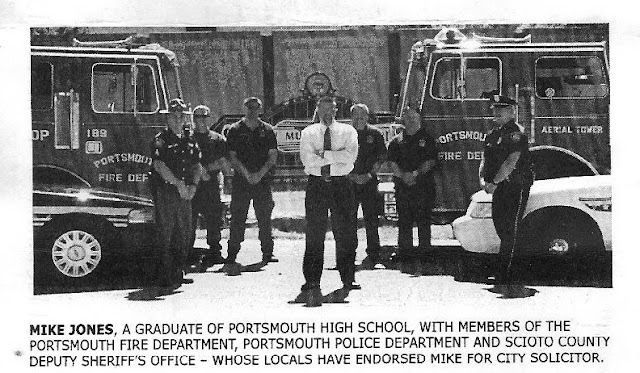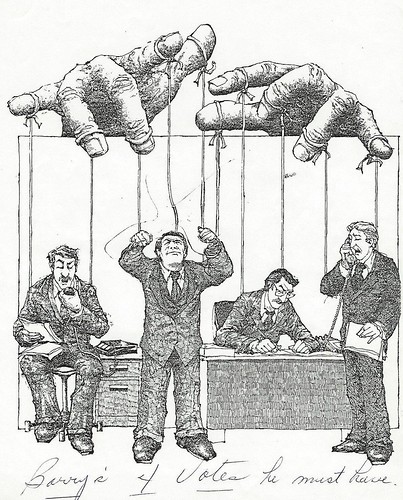
The flyer (shown above) that our heavily leveraged Portsmouth City Solicitor Mike Jones circulated during his campaign for that office shows him standing tall with representatives of the fire, police, and sheriff department. Jones stood tall and proud for the public employees unions during the campaign, but he has stood shamefully small for the public, showing himself, in my view, a tool of the SOGP, and a tool of the public employees unions, as well as a thorn in the side of Mayor Murray, whose resignation he has called for. Jones is one of those city officials who it is not clear whether it is his incompetence or his dishonesty that best explains his behavior in office.
It is unfair but public employees everywhere, and not just in Portsmouth, are stereotyped as being overpaid and underworked. But with the likes of Jim Kalb toddling off on long weekends when he was mayor to motorcycle races in the Carolinas for senior citizens, leaving the city and its financial problems untended until he returned with another trophy of a third place finish to put in the display case in the mayor’s office (I am not making up the display case), what were the residents to think of Portsmouth public employees if not that they were shortchanging the taxpayers who were paying their salaries? It did not help the public’s perception of Bauer and Kalb that their limited acumen—in Kalb’s case terminally limited acumen—was rumored to be further impaired by cocaine and weed: “Cough! Cough!”
There is no denying that in the current economic crises there is a serious problem across the country with public employees and public employees unions. In Portsmouth, the problem is even worse because of the relationship between our public employees and our corrupt politicians. To get reelected, Portsmouth politicians have catered to public employees. They want to stay in public office and out of the private sector, where too many of them had proved to be failures, such as the two previous mayors, Kalb, the goof-off grocery clerk, and Bauer, the out-to-lunch graphic designer. As mayors, both Bauer and Kalb had been in a mutually beneficial, you-scratch-my-back-and-I’ll- vote-for-you-relationship with public employees. Instead of serving as a serious negotiator, the city government, at least under Bauer and Kalb, had rolled over for the public employees unions, making concessions that have now come home to roost. Because the city government is restricted by law from how much it can tax property owners, it has steadily raised water and sewer rates to help pay the generous wages and benefits it has provided public employees. Portsmouth politicians have been robbing the public to pay for public employees. Because the city does not have to get voter approval to raise water and sewer rates, those rates have served as a cash cow, or ATM, to help pay for salaries and benefits of city employees, even though state law mandates that that income should not be used to pay general operating expenses.
I am sympathetic to public employees. I was a union president for state employees when I taught at Shawnee State University, and I don’t agree with the view, especially among conservatives, that only people in the private sector earn their keep because the private sector is competitive and depends on the profit motive. The view that employees in the public sector have little incentive to work hard because they are not competing with anybody and are not making profits, is not a view I share. I believe public employees do the often hard, sometimes dirty, and sometimes dangerous work that keeps our towns and cities functioning. (The military, incidentally, are also public employees who do dirty and dangerous non-profit work for relatively low pay.) Public employees are the ones who have to deal with the the trash and crime, as well as the occasional calamities, such as forest fires and floods, tornadoes and hurricanes, and they do it for wages that will never make them rich, in sharp contrast to the denizens of Wall Street who are paid very generous and sometimes exorbitant salaries and bonuses without necessarily doing anything useful and sometimes doing things that are very harmful to the public employees whose pension dollars they gamble with as if it were Monopoly money. The police and fire departments are to cities what the army and navy are to the nation: we could not live without them. But given the current economic crisis, which may continue for another five and possibly even ten years, can we afford to live with them?
The Reckoning
Because Mayor Murray has dared to put the contracts with public employees unions on the negotiating table and taken the position that there may have to be a reduction or at least a freeze of wages and benefits for public employees, she has been vilified in local chatrooms and insulted at City Council meetings. But other cities have already gone much farther than she has. A recent survey by the National League of Cities found that 51 percent of the cities reported they had cut or frozen salaries of city employees; 22 percent said they had revised union contracts and reduced wages and benefits; and 19 percent said they had resorted to furloughs. Local and state government contribute to these grim statistics. As a state, Ohio has a projected gap of $577 million in its 2011 budget. Cities in Ohio towns and cities are making or have already made drastic cuts in even the most essential of public services, such as the police and fire departments. Early in July 2010, the mayor of Chillicothe announced five day furloughs as a measure to help with the budget crisis. Six years ago, even before the current recession, five Chillicothe firefighters lost their jobs in an economy move. In 2009, Columbus firefighters agreed to a wage freeze and so did firefighters and police officers in Lancaster. “Every city of size, even if you're a city of 10,000, you're facing budget problems. The problems are pretty universal,” John Mahoney, deputy director of the Ohio Municipal League, told the Columbus Dispatch in December 2009. Last year, twenty local governments in Ohio, and one county, Scioto, of which Portsmouth is the county seat, were on Ohio's fiscal emergency list and were being supervised by state-run commissions. Unless Portsmouth takes corrective action, unless it takes its head out of the fiscal quicksand, it too may join the other twenty towns and cities whose finances are being supervised by state-run commissions. In March 2010, an official at the Ohio Office of Budget and Management told the Columbus Dispatch that in spite of isolated instances of theft in public office, the financial problems in Ohio communities are more often the result of the financial incompetence rather the dishonesty of public officials. We only wish that were the case in Portsmouth—that we only had to worry about the incompetence and not also the dishonesty of our public officials.
New York Times columnist Bob Herbert has called the current economic crisis, and accompanying grim unemployment picture, “The Horror Show,” but Portsmouth public employees and their relatives party at the Dickens Pub, owned by Portsmouth city councilman Nicholas Basham, like drunken passengers on the Titanic, or like those partying characters in Poe’s macabre story “Masque of the Red Death” who think they can escape the plague, the “red death,” as long as they don’t stop dancing. That’s like the public employees at the Dickens Pub thinking they can escape the unemployment line as long as they don’t stop drinking.
Guerilla Warfare
Because she has taken on the public employees unions, Murray has become the target of disgruntled city employees. Encouraged by their political allies in city government—council members John Haas and Nicholas Basham; City Solicitor Michael Jones; and City Clerk Joanne Aeh—disgruntled city employees are waging a kind of guerilla warfare against her. They are sniping at her on local websites and spreading lies and attempting to sabotage municipal services and functions. Just try to get a response for a public records request from City Solicitor Jones. I wrote in an earlier blog about SLAPPING, an acronym standing for Strategic Litigation Against Public Participation, or “How to Silence Your Critics by Using the Threat of Lawsuits.” Mike Mearan attempted to silence me by initiating legal action he never intended to follow through on. Murray’s disgruntled public employees are engaged in a form of SLAPPing, bringing as many lawsuits as they can to overwhelm he r with legal problems and prevent her from making the personnel cuts she thinks are necessary for the city to avoid bankruptcy. If all else fails, they hope to drive her crazy.
The health benefits and retirement packages for public employees can be an even bigger financial burden for city governments than wages. The costs associated with police and fire departments are among the biggest drain on city budgets nationwide. Fast-rising pension and health costs are making benefit costs grow more rapidly than wages. Some cities are taking drastic steps where fire and police departments are concerned. Oakland, California, one of the most dangerous cities in the country, laid off eighty police officers as recently as April 2010; and in San Jose California, on July 29, 2010, fifty-one firefighters turned in their badges and gear after negotiations with the city failed and they lost their jobs. The city had asked for a ten percent reduction in their pay as well as increased health care co-pays and premiums and other health care coverage reductions, but the firefighters union would agree to no more than a five percent reduction in their wages, but the San Jose mayor said these concessions were not nearly enough to balance the budget. In Maywood, California, a densely populated, blue-collar suburb of Los Angeles, almost all city employees, including the police department, were terminated. Maywood city services have nearly all been outsourced. The Los Angeles Sheriff’s Department has a contract to provide law enforcement for the community, at a big saving to Maywood, which no longer has to pay wages, health insurance, and other benefits to local police. Chaos was predicted when Maywood let go about sixty public employees, taking the axe to everybody, including the police department, but the chaos and crime wave did not materialize. The headline of the story on Maywood in the New York Times was, “A City Outsources Everything. Sky Doesn’t Fall.” Sounds crazy, doesn’t it, doing away with almost all public employees?
As recently as August 3, 2010, the New York Times reported that more and more public employees are being pressured to accept pay cuts rather than furloughs, which is a euphemism for mandatory unpaid vacations. The mayor of Albuquerque said, “When you’re trying to lower the cost of government while maintaining services, furloughs don’t do the trick.” The Times also reported that pay cuts are appearing most frequently among state and local governments, which are under extraordinary budget pressures and have often already tried furloughs, but have found, like the mayor of Albuquerque, that they are not enough to solve the financial dilemma. Mayors and governors across the country are pressuring public employees to accept a cut in pay and benefits, but nobody is calling their sanity into question as public employees and their allies are calling the Portsmouth mayor’s into question. All of the financial crises in Ohio and the nation seem to have little effect on the public employees of Portsmouth. They want to help drive her out of office and replace her with someone who will continue to deny financial reality, and with the assistance of City Solicitor Jones, who is acting like the public employees’ puppet, those unions just might succeed. Who is the crazy one in this situation, the mayor or the public employees unions?


.